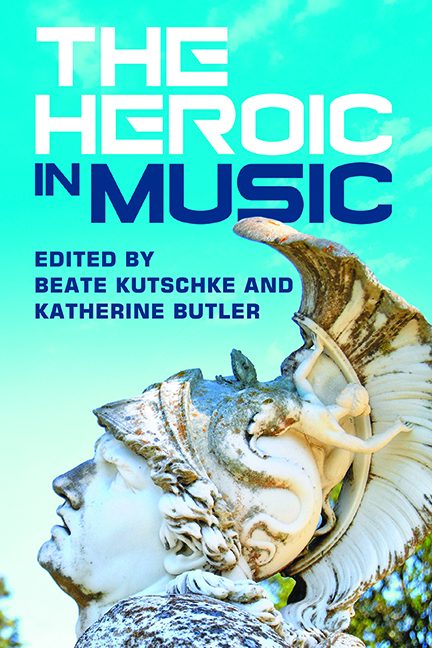Book contents
- Frontmatter
- Contents
- List of Illustrations
- Notes on Contributors
- Introduction
- Part I The Configuration of Heroic Music as a Tool for Shaping Moral and Political Identity
- Part II Music, its Ethics and Politics – Beyond ‘Beethoven Hero’
- Part III Heroic Music and its Moralities in Dictatorships and Post-Heroic Democracies
- Bibliography
- Index
12 - Émilie du Châtelet, Kaija Saariaho, and Heroes of the Twenty-First Century
Published online by Cambridge University Press: 16 July 2022
- Frontmatter
- Contents
- List of Illustrations
- Notes on Contributors
- Introduction
- Part I The Configuration of Heroic Music as a Tool for Shaping Moral and Political Identity
- Part II Music, its Ethics and Politics – Beyond ‘Beethoven Hero’
- Part III Heroic Music and its Moralities in Dictatorships and Post-Heroic Democracies
- Bibliography
- Index
Summary
Kaija Saariaho's Émilie Suite (2011) musically stages the story of Émilie du Châtelet, the eighteenth-century scientist and natural philosopher. Du Châtelet died during childbirth at the age of forty-two while completing her translation of and commentary on Isaac Newton's Philosophia Naturalis Principia Mathematica into French as Principes mathématiques de la philosophie naturelle. Saariaho's Émilie Suite is a five-movement version of her nine-movement monodrama Émilie, both using a libretto by Amin Maalouf. With obvious connections to the opera, the Émilie Suite is my focus here for practical reasons. The suite has three primary movements – ‘Pressentiments’, ‘Principia’, and ‘Contre l’oubli’ – and two interludes connecting them. The first movement focuses on Du Châtelet's premonitions of death as she completes her Newton translation; the second movement is the Suite's climax as she completes the translation and understands that death is imminent; the last movement marks her intellectual legacy and then eventually her death.
The story of Du Châtelet's scientific work as a woman in a male-dominated discipline, the completion of the Newton translation, and her subsequent death has all the trappings of a heroic narrative. Yet her story has been mostly ignored until the late twentieth century, and now in the twenty-first there has been a rapid increase in scholarly and journalistic writings and dramatizations of Du Châtelet's life and work. Saariaho's own interest in Du Châtelet came about after reading a book about her by the contemporary French philosopher Élisabeth Badinter. In this chapter, I first consider the story of Du Châtelet's work and life, the heroic events of her life, and the ways that Saariaho and Maalouf have shaped the narrative in a heroic arc. Second, I consider the topic of musical heroism in the Suite, and third, I turn to the larger question of what a heroic musical style might be in the twenty-first century.
Narratives of Heroism
Gabrielle Émilie Le Tonnelier de Breteuil (1706–49) was born into a well-connected French family. Her father, in the government of Louis XIV, often held salons attended by leading intellectuals of the French Enlightenment. She was tutored extensively as a child and regarded as an intellectual prodigy. Married, by arrangement, to the Marquis Florent-Claude du Châtelet-Lomont in 1725, Du Châtelet had three children, and after the birth of her third child in 1733, she resumed her studies and mathematical/scientific work.
- Type
- Chapter
- Information
- The Heroic in Music , pp. 225 - 236Publisher: Boydell & BrewerPrint publication year: 2022



